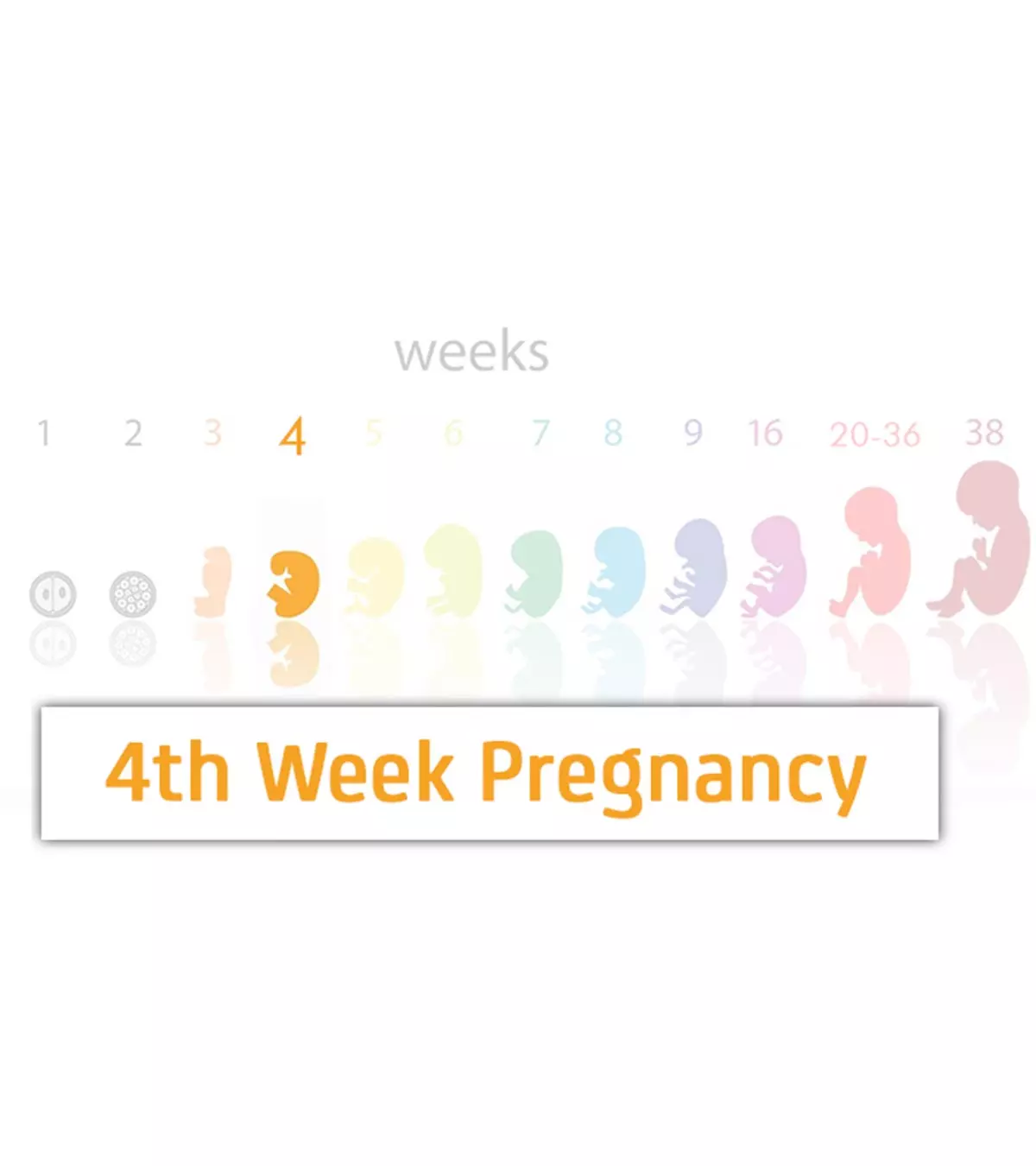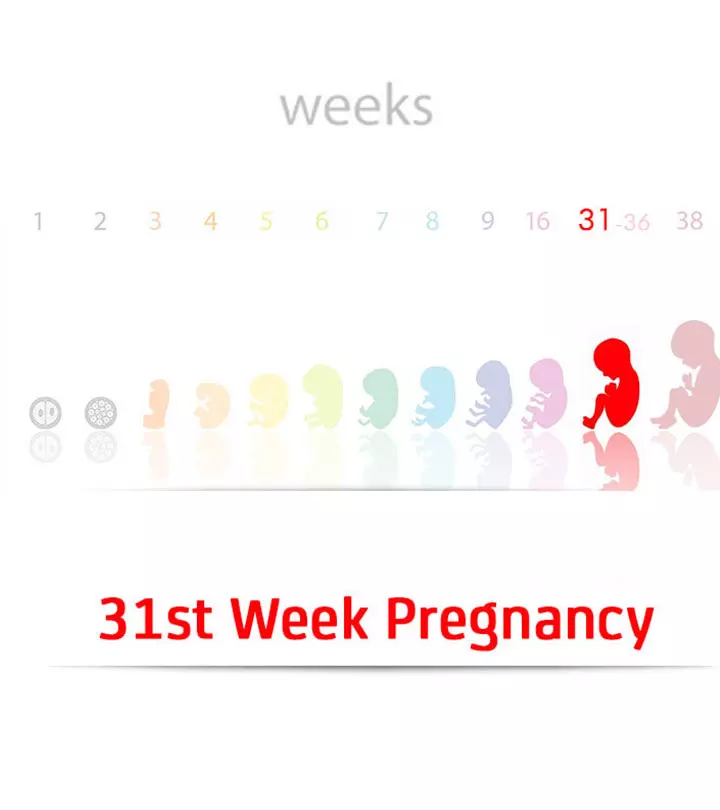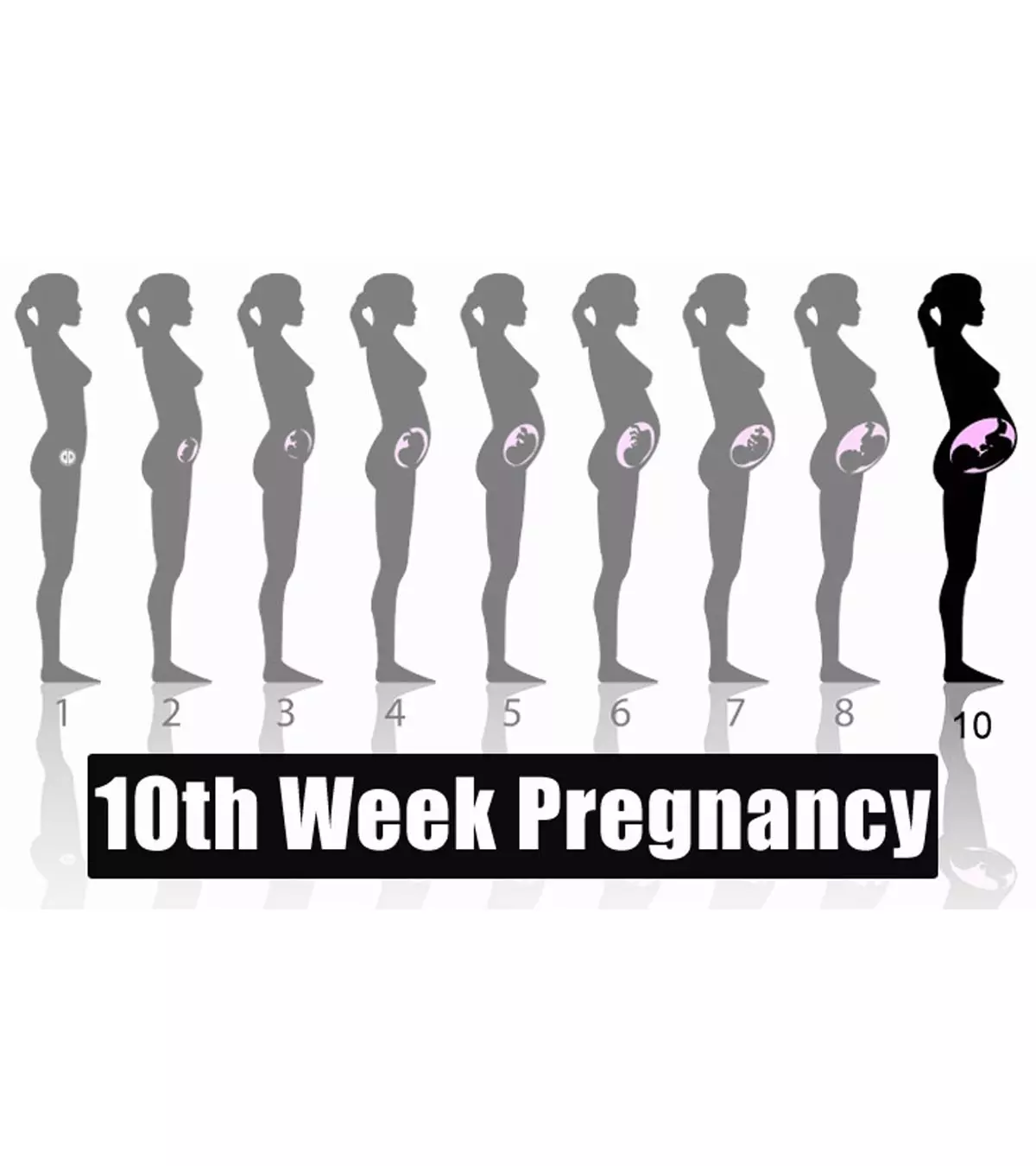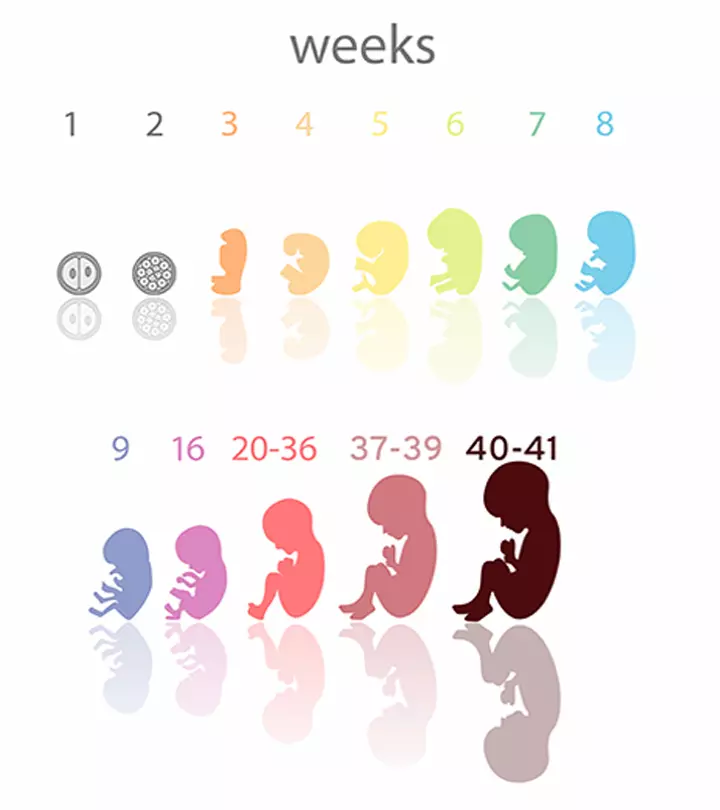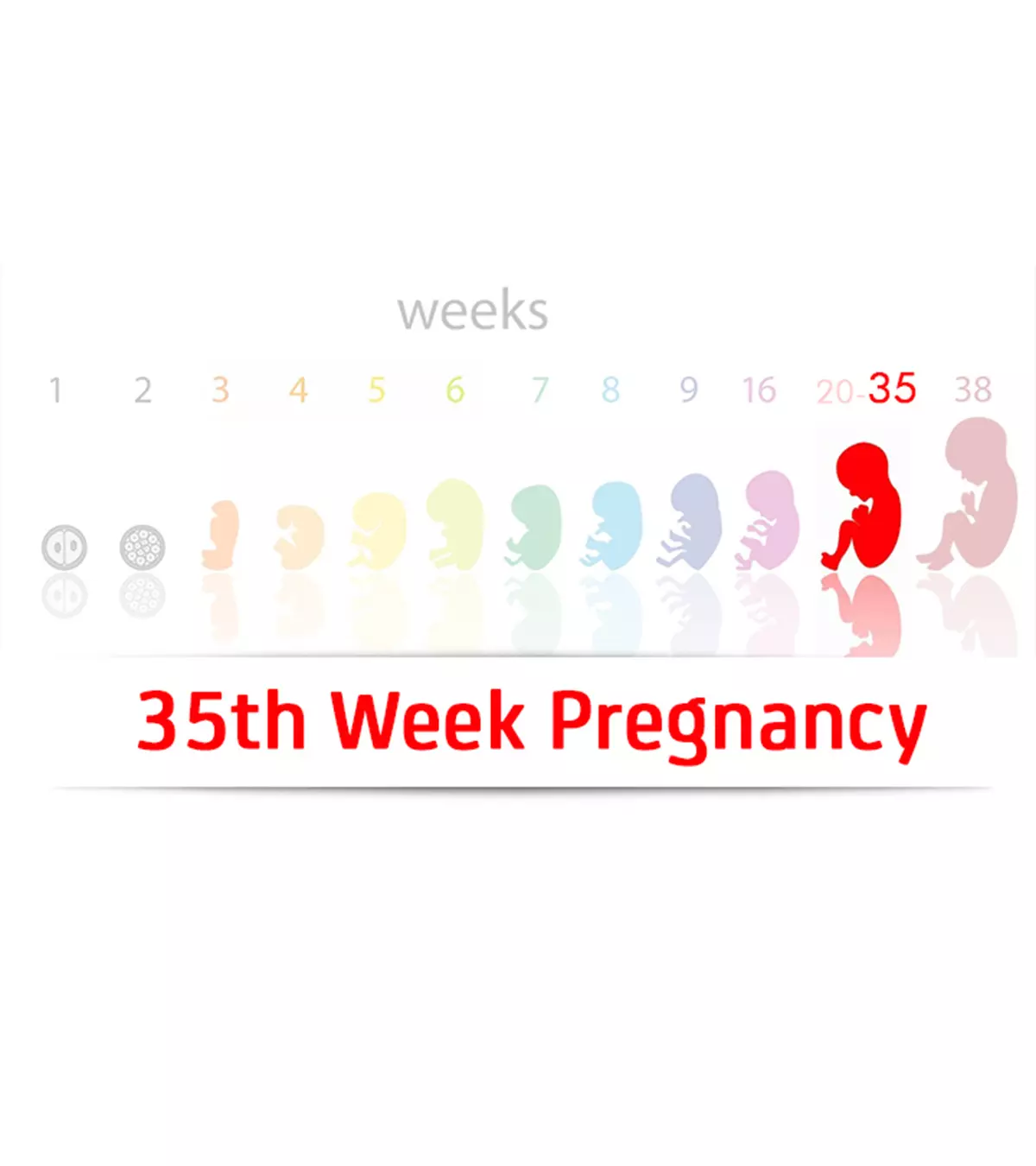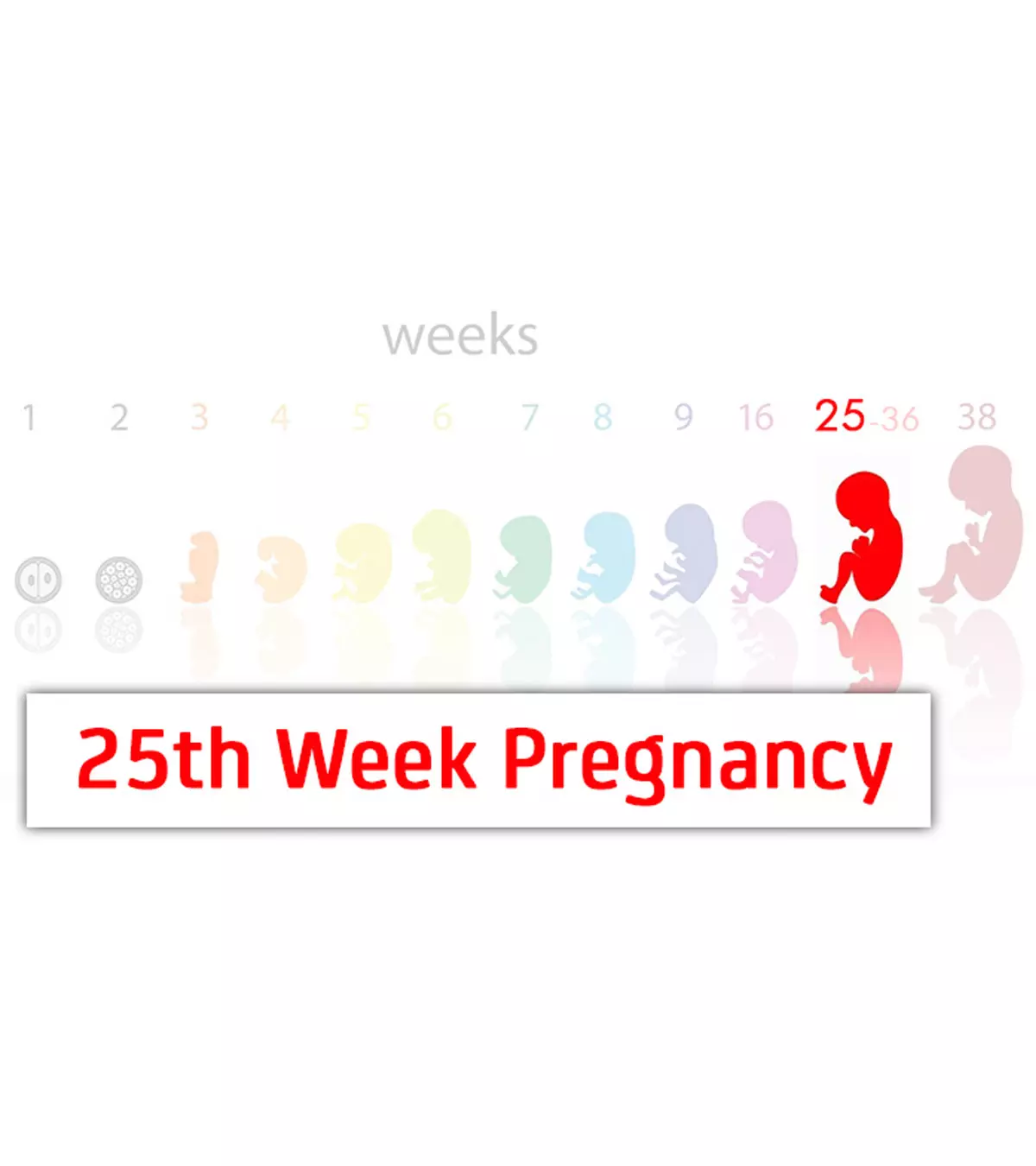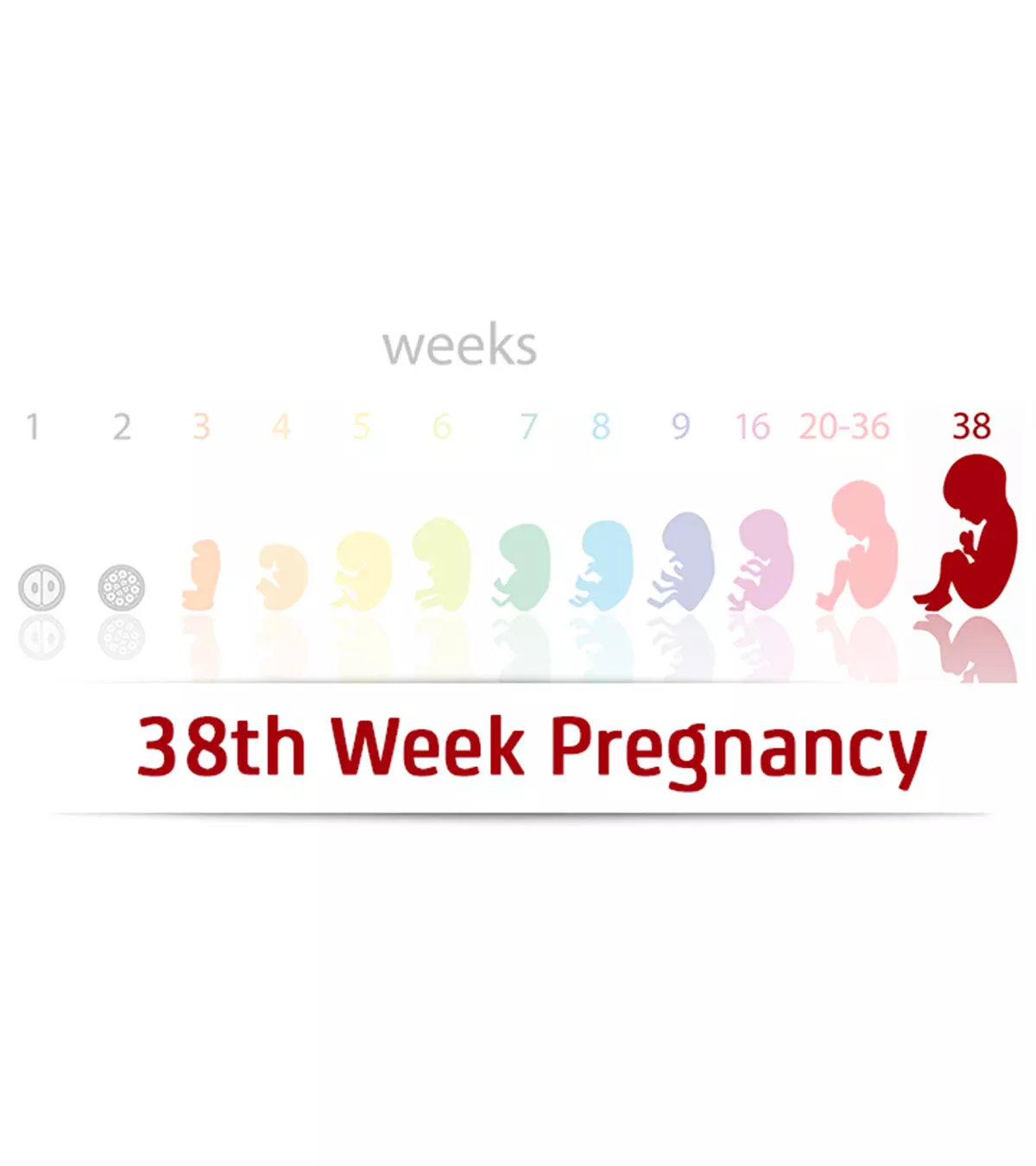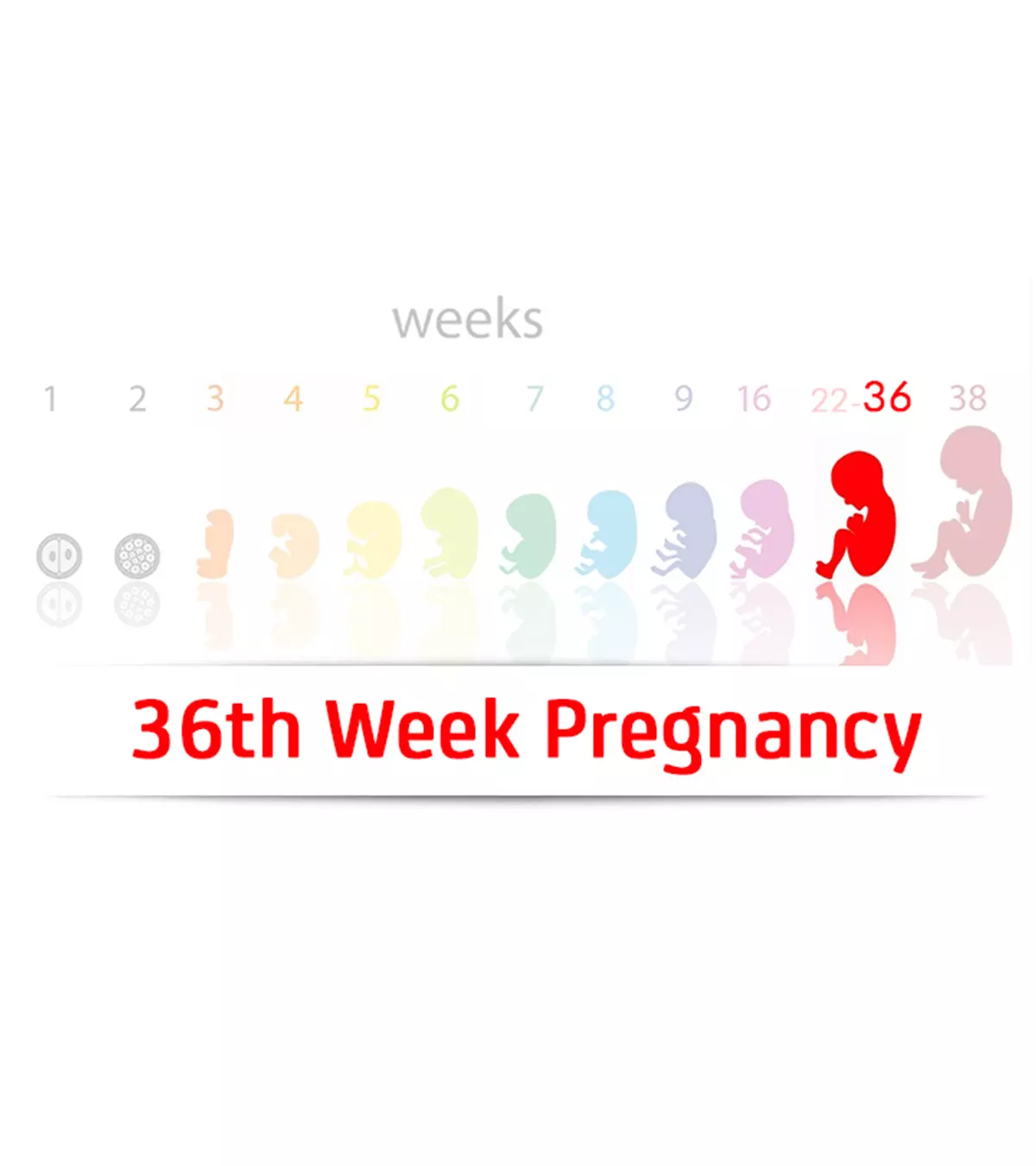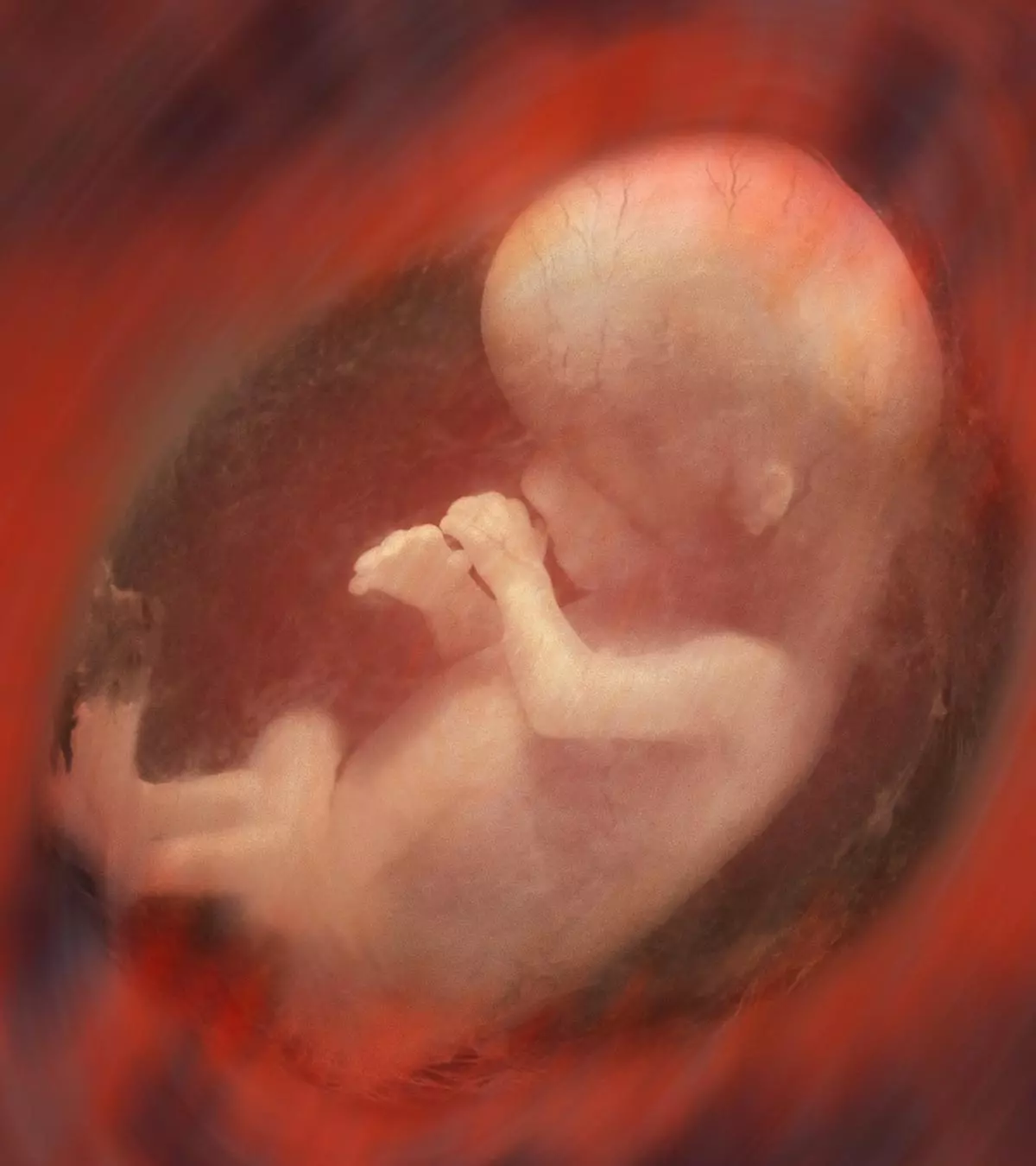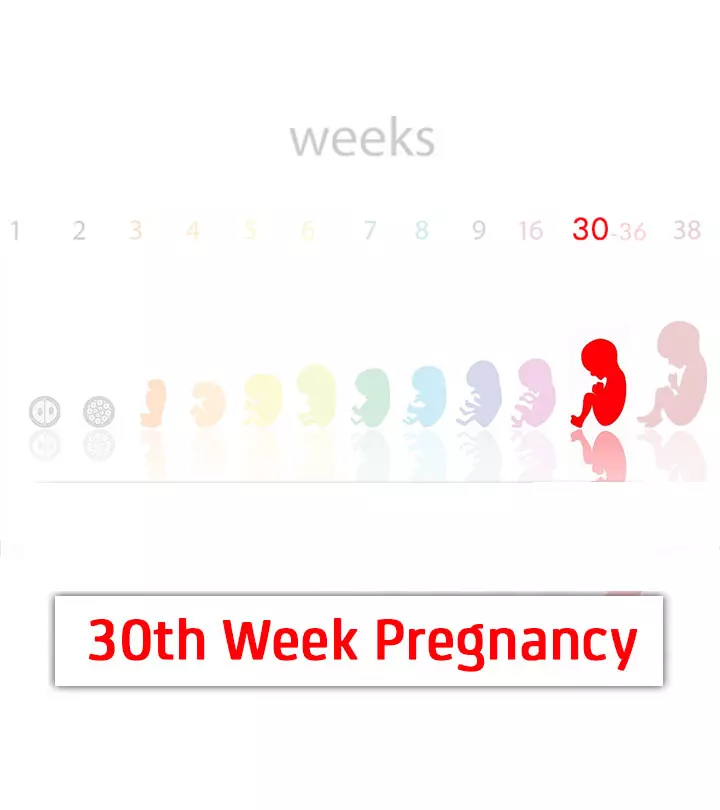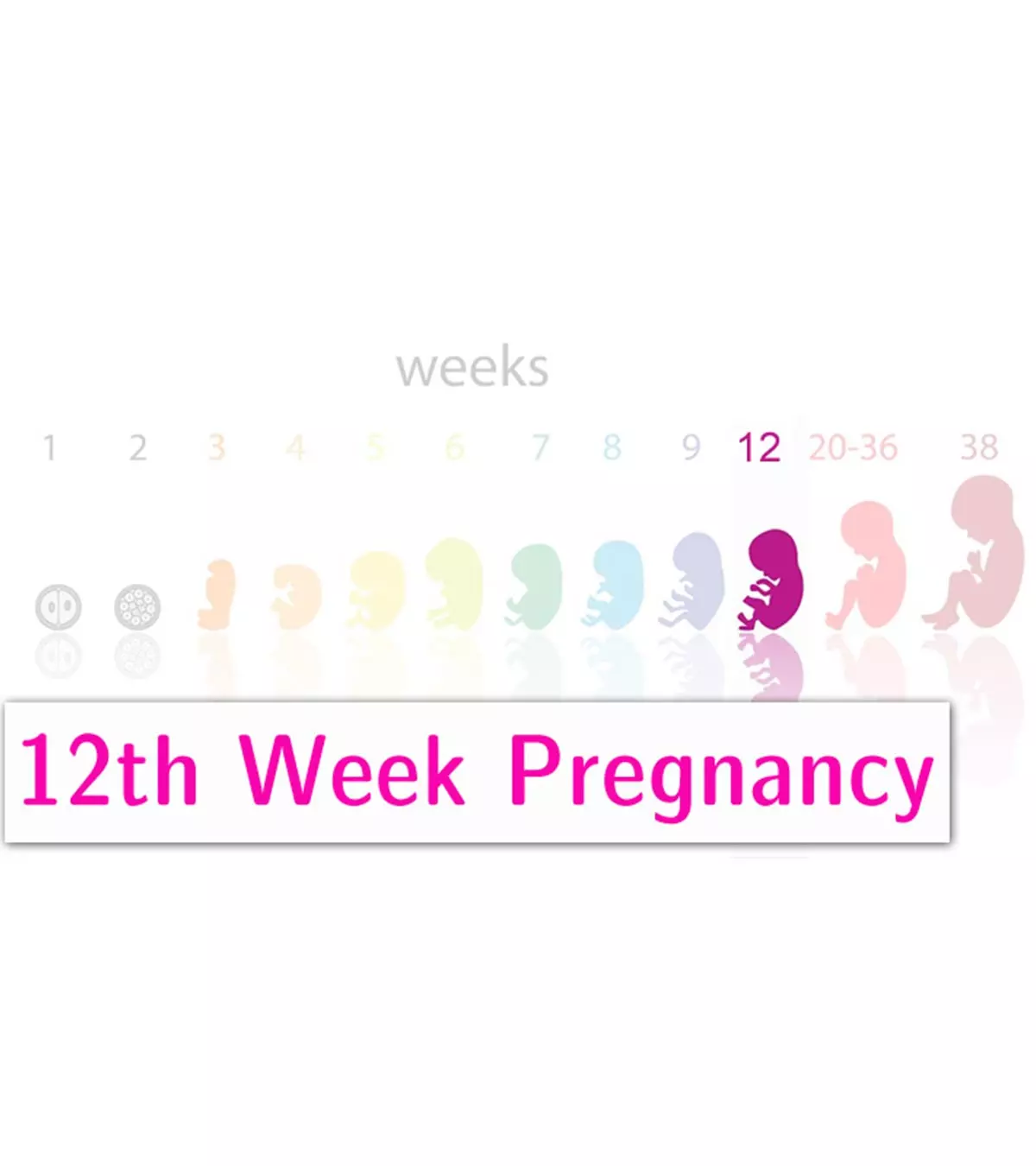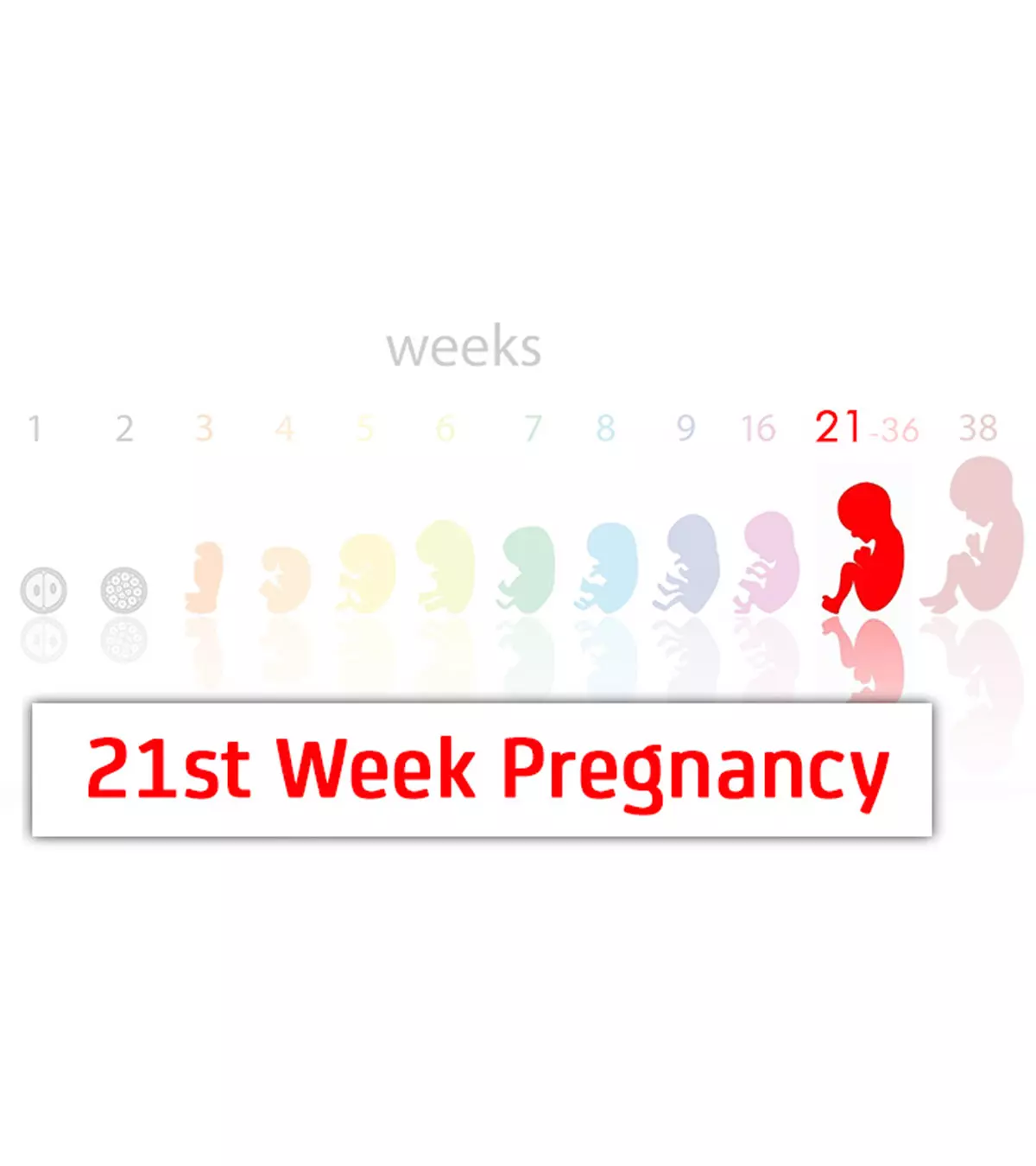
Image: ShutterStock

Key Pointers
- The baby’s ears begin to respond to sounds, and its eyebrows, eyelashes, and digestive system develop at 21 weeks.
- Symptoms include heartburn, indigestion, Braxton Hicks contractions, increased appetite, backache, physiological edema, and fast-growing nails.
- Physical changes in the mother may include an enlarged belly and breasts, blue veins, colostrum leakage, oily skin and acne, and stretch marks.
- During the 21st week, doctors may perform an anomaly scan and maternal serum quad screen tests.
How Many Months Are 21 Weeks Of Pregnancy?
At 21 weeks, you are in the fifth month of pregnancy. By now, you would’ve felt your baby move a little, although these movements are infrequent and feel like you have butterflies in the stomach.
Tessa Rayanne, an expecting mom, shares her pregnancy journey at 21 weeks and says, “I have a nudger inside! He is fully active and nudging on my insides. I get so excited with every movement I feel. I jerk my husband with my elbow and demand he put his hand on the belly to experience the joy that I’m experiencing. It’s pretty magical, and I just want everyone to feel it (i)!”
Here, MomJunction tells you more about how your body changes and your baby grows in the 21st week.
How Big Is Your Baby At 21 Weeks?
In the 21st week, your baby is about the size of a carrot and measures 10.51in (26.7cm) in length and weighs 12.7oz (360g) (1)(2)
.
What Is The Baby’s Development At 21 Weeks?
Here is how your baby’s body is developing in this week:
| Body parts | Developmental stage |
|---|---|
| Ears | The baby starts responding to sounds |
| Eyes (3) | Eyebrows and eyelashes are developing |
| Digestive system | Starts working |
| Skin | Covered with a waxy coating called vernix |
| PlacentaiA temporary organ that develops during pregnancy and provides the fetus with oxygen and nutrients | Keeps growing |
| Lanugo (4) | The body is covered with soft, fine hair |
| Mouth (5) | Taste buds develop, and the baby starts swallowing amniotic fluidiAmniotic fluid: Clear, yellowish fluid that cushions the baby in the uterus |
| Circadian rhythmsiNaturally maintained 24-hour clock by the body that regulates the sleep cycle, hormones, and other body functions (6) | Heart rate, breathing pattern, and body movements follow a rhythmic pattern |
| Liver and spleen (7) | Make blood cells |
| Bone marrow | Developed and contributes to blood cell formation |
| Limbs | The kicks get stronger, and the baby constantly moves inside the womb |
| Gender | Can be determined through an ultrasound scan |
As the baby grows and develops new functions, you will experience certain symptoms. Read about that next.
What Symptoms Do You Experience In The 21st Week Of Pregnancy?
Here are some common symptoms you might experience during this week:
- Weight gain: It should be based on your BMI (8).
| BMI | Below 18.5 | 18.5 – 24.9 | 25 – 29.9 | 30 and Above |
|---|---|---|---|---|
| RECOMMENDED WEIGHT GAIN | About 13 Kg | 11- 16 Kgs | 7-11kgs | 5-9kgs |
- Heartburn/indigestion: The gastric fluids in the stomach are pushed up into the esophagus due to the pressure exerted by the growing uterus, causing heartburn during pregnancy.
While many women get relief from morning sickness by this week, some may still experience it due to hormonal changes or other medical conditions.
 Point to consider
Point to consider- Braxton Hicks contractions: These are irregular, spontaneous, and less painful contractions that help prepare the body for labor.
Rayanne adds, “I had my first identifiable braxton hicks at 21 weeks and 1 day. It didn’t hurt at all; it just got really tight, and my stomach was in a tiny little ball. He’s kicking like crazy now. And I mean big, big kicks that even my hubby can feel.”
- Increased appetite: The hunger pangs may increase, so have small meals at frequent intervals. Pack snacks or fruits for your office and eat them whenever you are hungry.

- Fast-growing nails: The hormonal changes and increased blood circulation provide extra nutrients to your hair and nails and make them grow faster.
- Backache: The extra weight of the baby puts pressure on the lower back causing backache.
- Physiological edema: Water retention in the body causes swelling of hands and feet.
- Frequent urination: The pressure exerted by the growing uterus on the bladder increases the frequency of urination.
- Varicose veins: The extra blood flow to the lower part of the body causes the veins to swell.
Tip: Keep the legs elevated and avoid standing for long hours. Maintain a healthy weight during pregnancy and add more fiber to your diet to avoid constipation.
- Urinary tract infection (UTI): The extra pressure put on the bladder by the growing uterus can block the urine flow and cause UTI during pregnancy. Symptoms of UTI include:

- Pain or burning sensation while passing urine
- Fever
- Chills
- Urinating more frequently than before
- Pain or cramps in the pubic area
- Foul smelling or turbid urine
Tip: Drink plenty of water. Avoid holding urine for long as it promotes bacterial growth in the urinary tract.
 Did you know?
Did you know?What Changes Occur In The Body At 21 Weeks Of Pregnancy?
- Enlarged belly: As the baby attains good growth by this week, the uterus enlarges and your belly bump shows.
- Enlarged breast: The breasts grow in size as the body starts preparing for milk production.
- Blue veins: The veins surrounding the breasts become more prominent due to an increased blood supply.
- Colostrum leak: The yellow fluids (the first milk) may start leaking from the nipples.
- Oily skin and acne: The hormonal changes cause excess production of sebum (oil produced from skin), resulting in acne during pregnancy.

Tips: Clean the face with lukewarm water and use oil-free creams and cosmetics. Wash your hair daily or as often as needed to remove the excess oil.
- Stretch marks: The skin stretches with the growing uterus, creating stretch marks. The skin may also become dry and itchy. Applying a good moisturizing lotion can help reduce the itchiness.
The symptoms you experience now are not all pleasant. But if they are making you uneasy, talk to your doctor about them during the regular prenatal visit.
What Is Your OB/GYN Visit Like?
During this week, your obstetrician/gynecologist will check the:
- Blood pressure
- Weight gain
- Fundal height
- Fetal heart rate
The doctor may also recommend a urine test, besides other tests, to determine the protein and sugar levels.
What Tests Are Done In The 21st Week?
- Anomaly scan: Done between 18 weeks and 20+6 weeks, this ultrasound scan determines the physical abnormalities in the baby (9) It can check for 11 physical conditions including:
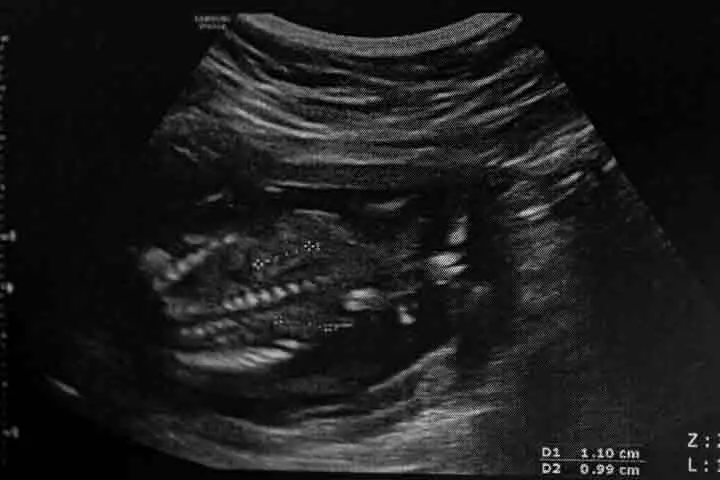
- Open spina bifidaiA congenital disorder where the spinal cord doesn't fully develop, leading to physical and neurological complications
- AnencephalyiA congenital condition identified by incomplete development of the brain and skull in the baby
- Diaphragmatic herniaiA genetic condition where there is a hole in the diaphragm, causing the abdominal organs to move into your chest
- Cleft lip
- ExomphalosiIncomplete development of abdominal wall in babies
- Gastroschisisi A birth condition identified by a hole in the abdominal wall that may allow the intestines to exit through it
- Cardiac abnormalities
- Lethal skeletal dysplasiaiA congenital condition characterized by underdeveloped bones and cartilage
- Bilateral renal agenesisiA condition causing the complete absence of kidneys at birth
- Patau's syndromeiA genetic condition caused by having an extra copy of chromosome 13 in all the cells or T13
- Edwards' syndromei A severe chromosomal condition affecting fetal growth and development or T18
All anomalies cannot be detected by this scan; the detection rate is 80%.
- Maternal serum quad screen (10): This screening test will be done if you have missed the sequential screening tests in the first trimester. It checks for the level of four substances in the blood like alpha-fetoproteiniA protein present in the mother’s blood and the amniotic fluid, also used as a tumor marker (AFP), estrioliA form of estrogen that helps the uterus grow and stay healthy , human chorionic gonadotropiniA hormone produced by placental cells during pregnancy , and inhibin-A. These tests detect Down syndrome and neural tubeiA hollow structure in the developing embryo that forms the brain and spinal cord defects in babies (10).
Make sure you get all the recommended tests done and follow a healthy lifestyle. Next, we have a few tips on how to stay healthy this week.
What Are Some Tips For Moms-To-Be?
Here are some tips for you to follow during this week:
- Drink plenty of water to stay hydrated.
- Eat small meals at regular intervals and have home cooked food.
- Add fruits, vegetables, dairy products, beans, and meat in the diet. Some recipes you can add to your 5th month of pregnancy diet to satisfy your cravings include celeriac, watercress soup, and sweet apple lamb.
- Exercise moderately; walking is ideal to keep up your energy level.
- Maintain oral hygiene by brushing and flossing your teeth regularly.
- Avoid smoking, drinking alcohol, and using illicit drugs, as they can affect fetal development.
- Keep stress at bay.
- Wear loose, breathable maternity clothes to accommodate your growing baby bump.
- Give your body enough rest.
- Consider reading books covering pregnancy, breastfeeding, and postpartum topics.
- Take your prenatal vitamins as prescribed by your doctor. However, you must avoid taking any other medicines without the doctor’s permission.
- Avoid sitting with your legs crossed as it can cause a backache.
- Avoid oily and fatty foods and add more fiber to your diet. It helps reduce constipation.
- Wear comfortable footwear.

- To combat fatigue while working, it’s crucial to avoid prolonged sitting. Try to take short walks whenever possible..
- Enroll in childbirth classes to prepare for labor and delivery.
- Spend time with family and friends and plan a baby shower if you haven’t done so already.
Whenever needed, seek your partner’s help and support.
 Do remember
Do rememberWhat Are Some Tips For Dads-To-Be?
Here are some tips for the dad-to-be:
- Share the household chores to lessen your burden.
- Create a pleasant environment at home.
- Accompany your partner to all prenatal care visits.
- Go for maternal shopping or plan a romantic date.
- Give you a good neck or foot massage to ease your discomfort.
- Learn the best and fastest route to the hospital before the due date.
Frequently Asked Questions
1. What pains are normal at 21 weeks pregnant?
If you are 21 weeks pregnant, you may experience (11) (12)
- Round ligaments pain caused on the sides of your bump due to the expanding uterus
- Breast pain
- Sharp pain in the abdomen that may travel to your thighs
- Back pain
- Pain due to hemorrhoids
- Sharp pain in the legs
2. Why is my stomach so tight at 21 weeks pregnant?
Your stomach may feel tight if you experience Braxton Hicks contractions. During these contractions, the uterus tightens, making your stomach also feel tight and firm (13).
Another cause of tightness in the stomach may be a condition called polyhydramnios, where the excess amniotic fluid collects in the uterus. This makes the uterus larger than normal, leading to a tight stomach (14).
3. What is the position of my baby at 21 weeks?
At 21 weeks, your baby is small and may frequently be changing positions in the uterus (15). The position of the baby is not fixed.
You are halfway through your pregnancy at 21 weeks and may experience a slew of physical and emotional changes. You may also gain some weight and experience increased appetite, heartburn, backache, and an urge to urinate frequently. However, keep yourself calm, eat a balanced diet, and drink plenty of water. In addition, exercise moderately and avoid drinking alcohol and smoking. Though uneasiness is common during this time, do not let it take a toll on your mental health. Instead, find ways to stay stress-free and engage in safe leisurely activities.
Infographic: Fetal Developments In The 21st Week Of Pregnancy
Being 21 weeks pregnant means you’re already in your second trimester of pregnancy, and your fetus is as big as the size of a carrot. If you’re curious about how much your fetus has developed at this stage, check out the infographic below to explore significant fetal developments.

Illustration: Momjunction Design Team
Illustration: 21st Week Pregnancy: Symptoms Baby Development And Tips

Image: Stable Diffusion/MomJunction Design Team
Week 21 of pregnancy is an exciting time! Watch this video and gain insights into fetal development and the remarkable growth of your baby.
Personal Experience: Source
MomJunction articles include first-hand experiences to provide you with better insights through real-life narratives. Here are the sources of personal accounts referenced in this article.
i. 21 weeks pregnant update.https://tessarayanne.blogspot.com/2013/03/21-weeks-pregnant-update.html
References
- Week by Week Fetus Size Demonstrated by Fruits.
https://epaoa.org/week-by-week-fetus-size-demonstrated-by-fruits/ - Fetal Development.
https://embryology.med.unsw.edu.au/embryology/index.php/Fetal_Development#Week_21_to_Week_25 - Stages of pregnancy.
https://womenshealth.gov/pregnancy/youre-pregnant-now-what/stages-pregnancy - You and your baby at 21 weeks pregnant.
https://www.nhs.uk/pregnancy/week-by-week/13-to-27/21-weeks/ - Baby’s Palate And Food Memories Shaped Before Birth.
https://www.npr.org/2011/08/08/139033757/babys-palate-and-food-memories-shaped-before-birth - Prenatal Summary.
https://www.ehd.org/prenatal-summary.php - Week 21.
https://kidshealth.org/en/parents/week21.html - Pregnancy Weight Gain.
https://americanpregnancy.org/healthy-pregnancy/pregnancy-health-wellness/pregnancy-weight-gain/#:~:text=On%20a%20trimester%20basis%20in - 20-week screening scan.
https://www.nhs.uk/pregnancy/your-pregnancy-care/20-week-scan/ - Prenatal Genetic Testing.
https://www.nm.org/conditions-and-care-areas/womens-health/obgyn/obstetrics/prenatal-care/prenatal-genetic-testing - Week-by-week guide to pregnancy.
https://www.nhs.uk/start-for-life/pregnancy/week-by-week-guide-to-pregnancy/2nd-trimester/week-21/ - Pregnancy Discomforts: Back Pain Round Ligament Pain Nausea.
https://my.clevelandclinic.org/health/articles/pregnancy-pains - Stomach Pain in Pregnancy.
https://americanpregnancy.org/healthy-pregnancy/pregnancy-complications/abdominal-pain-during-pregnancy/ - Polyhydramnios.
https://my.clevelandclinic.org/health/diseases/17852-polyhydramnios - Your pregnancy: weeks 21 to 24.
https://healthy.kaiserpermanente.org/health-wellness/maternity/second-trimester/weeks-21-24 - Pregnancy at week 21.
https://www.pregnancybirthbaby.org.au/pregnancy-at-week-21#remember - 21 weeks pregnant.
https://raisingchildren.net.au/pregnancy/week-by-week/second-trimester/21-weeks#you-at-21-weeks-pregnant-nav-title
Community Experiences
Join the conversation and become a part of our nurturing community! Share your stories, experiences, and insights to connect with fellow parents.
Read full bio of Subhashis Samajder
Read full bio of Sakshi Mishra
Read full bio of Rebecca Malachi
Read full bio of Aneesha Amonz





